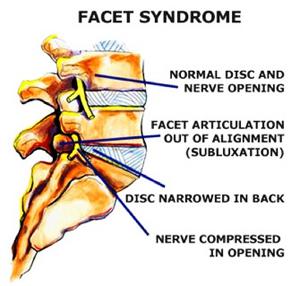 Facet Joint Syndrome
Facet Joint Syndrome
One of the most common causes of lower back pain is facet joint syndrome. Facet joint syndrome is a disorder mostly caused by structural degeneration of one or more spinal joints by which can eventually cause pain. It may occur in the upper back or lower back. If the condition occurs in the cervical spinal area or upper back, it is called cervical facet syndrome. If it occurs in the lumbar spinal area or lower back, it is called lumbar facet syndrome.
The Spinal Facet Joint
The facet joints link the vertebrae directly above and below to form a working unit that permits movement of the spine. The structure of the facet joint is identical to other joints in the body, such as knees and hips. The boney surfaces of the facet joints are covered with a specialized tissue called hyaline cartilage. The joint is lined by a membrane called the synovium and enclosed in a fibrous sac called a joint capsule. A thick liquid (synovial fluid) surrounds the joint, allowing the bones to move without friction.
Facet joint deterioration can lead to the development of bone spurs (osteophytes), which grow along the edges of vertebral openings in response to diminished spinal stability. In the lower back, if these spurs come into contact with adjacent nerve roots or the nearby sciatic nerve, it can produce pain, tingling, numbness, and muscle weakness in the buttocks, legs, and feet.
Causes of Facet Joint Syndrome
In many cases, facet syndrome is caused by trauma, such as a whiplash injury of the neck suffered in a motor vehicle accident. Also, degenerative changes in the cervical, thoracic and lumbar spine can lead to abnormal stress and strain that results in an increased load on the facet joints. Finally, abnormal postures can overload spinal tissues, including the facet joints, and cause inflammation and pain in these joints.

Some of the symptoms of Facet Joint Syndrome include:
1.) Severe spinal pain, particularly when engaged in movement.
2.) Stiffness and limited motion ability in the area of the back.
3.) Pain becomes worse upon bending backwards or straightening the back.
4.) When the lumbar nerve is affected, sciatica symptoms may occur.
5.) An onset of Pinched Nerve symptoms may arise, particularly in the area of the cervical spine.
Suffering from Facet Joint Syndrome
Individuals suffering from facet syndrome may feel worse in the morning, due to increased inflammation and stiffness that occurs during a resting period. They tend to have stiffness and usually will feel somewhat better after they have been moving around. As the day progresses they tend to be ok as long as they keep moving. However, for those having to work seated all day or work from a computer, they may find they are at a greater risk of experiencing pain throughout the day. Patients often try shifting their posture in an attempt to find relief. But while this temporarily reduces discomfort, the resulting poor posture can trigger muscle spasms in the surrounding tissue, forcing the irritated facet joints more firmly together and making movement in the low back even more painful.
Treatment for Facet Joint Syndrome
Conservative treatments for facet syndrome should always be considered first before resorting to more drastic and costly measures such as surgery. People with lumbar facet syndrome respond particularly well to chiropractic care. If you’re experiencing symptoms mentioned above and are in the Augusta area, you can schedule a free consultation at Georgia Clinic of Chiropractic. While the mechanisms underlying facet syndrome are similar for everyone, there are factors unique to each patient, however, which determine what type of care will work best for you. If your condition is out of our scope of care, or we believe someone else may be a better choice for you, we will research who the best medical professional would be and give you a referral.
Georgia Clinic of Chiropractic is conveniently located off Furys Ferry Rd in Martinez, Georgia and provides quality chiropractic care to the Augusta, Martinez, and Evans communities. To schedule an appointment, call (706) 814-5053 or visit www.georgia-clinic.com for more information.
